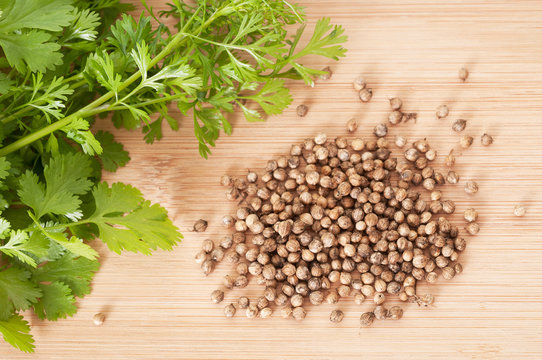Coriander leaves are a common ingredient in Indian and Thai cuisines. Coriander is known for its many health benefits, including reducing heart disease risk factors, aiding digestion, boosting the immune system, and aiding weight loss. Here are five of the best health benefits of coriander leaves:
Coriander decreases heart disease risk factors by improving blood circulation and preventing blood clots.
What is Coriander?
Coriander, also known as cilantro or Chinese parsley, is a herb commonly used in cooking and traditional medicine. It is widely cultivated in many regions of the world for its leaves and seeds, which are both flavorful and nutritious. The leaves of the coriander plant have a citrusy, slightly sweet taste that can add depth to a variety of dishes. Meanwhile, coriander seeds have an earthy flavor that makes them popular as a spice.
One of the major health benefits associated with coriander is its ability to aid digestion. It contains compounds that stimulate digestive enzymes and improve peristalsis (the movement of food through the digestive tract), which can help prevent constipation and other digestive issues. Coriander may also help reduce inflammation throughout the body due to its high antioxidant content.
Another potential benefit of coriander is its ability to lower blood sugar levels. Some studies suggest that consuming coriander regularly may help regulate insulin production and reduce insulin resistance, which can be beneficial for individuals with type 2 diabetes or prediabetes. Additionally, some research has found that coriander may possess antimicrobial properties that could help fight off harmful bacteria in the gut or on the skin.
The 5 Best Health Benefits of Coriander Leaves
wellhealthorganic.com : coriander-leaves-5-best-health-benefits
1) Coriander leaves are rich in antioxidants, which helps in fighting against free radicals that damage the body’s cells. They also have anti-inflammatory properties that help to reduce inflammation and swelling. This makes it an excellent herb for people suffering from arthritis, asthma, and other inflammatory conditions.
2) The essential oils present in coriander leaves stimulate digestion by increasing digestive enzymes’ secretion. It also aids in reducing bloating, gas, and constipation problems by improving bowel movements.
3) Coriander is a great source of Vitamin K that plays a significant role in the blood clotting process. It also contains calcium, which helps maintain bone health and prevents osteoporosis.
4) Coriander has antibacterial properties that make it useful as a natural preservative. Adding coriander to food can help prevent spoilage while adding flavor and nutrition to the dish.
5) Finally, consuming coriander has been shown to improve sleep quality due to its sedative effects on the nervous system. It may provide relief for those with insomnia or restless sleep patterns. In conclusion, incorporating coriander into your diet can provide numerous health benefits while adding flavor to your dishes!
What You Need to Know Before Using Coriander Leaves
Coriander leaves, also known as cilantro, are a popular herb used in many cuisines around the world. But before you start adding it to your dishes, there are a few things you should know.
Firstly, coriander leaves have a strong flavor and aroma that can be overpowering if not used correctly. It’s best to use them sparingly and gradually increase the amount until you find the right balance for your taste buds.
Secondly, coriander leaves are packed with nutrients and health benefits. They contain antioxidants that can help protect against diseases like cancer and heart disease. They also have anti-inflammatory properties that can reduce swelling and pain in the body.
Lastly, some people may have an allergic reaction to coriander leaves. If you’ve never tried them before, it’s best to start with a small amount and monitor your body’s reaction before consuming more. Overall, coriander leaves can be a delicious and healthy addition to your diet if used properly and with caution.

How to Use Coriander Leaves for Health Benefits
Coriander leaves, also known as cilantro, are versatile herbs that can be used to add flavor to various dishes. They are an excellent source of vitamins and minerals such as vitamin C, calcium, iron, and magnesium. Additionally, they have numerous health benefits that make them a must-have in your diet.
One of the most significant health benefits of coriander leaves is their ability to aid digestion. The herb contains compounds that help stimulate digestive enzymes and promote the secretion of digestive juices. It can alleviate diarrhea and bloating while improving gut health.
Coriander leaves are also rich in antioxidants that help fight inflammation in the body. These antioxidants protect against chronic diseases such as cancer and heart disease by neutralizing free radicals in the body. Incorporating coriander leaves into your diet can improve overall health and reduce the risk of developing these conditions.
Conclusion
In conclusion, coriander leaves offer an array of health benefits that can positively impact one’s overall well-being. From aiding in digestion to promoting healthy skin, these versatile leaves are a great addition to any diet. Coriander is rich in antioxidants and has anti-inflammatory properties, making it useful in preventing diseases such as cancer and Alzheimer’s.
Furthermore, coriander has been shown to have antibacterial properties that can help fight against infections caused by harmful bacteria. The high levels of vitamin K present in the leaves also make them effective in reducing the risk of osteoporosis and other bone-related conditions. Overall, incorporating coriander into your daily diet can lead to many positive health outcomes.
In summary, while coriander may seem like just another herb used for cooking, its numerous health benefits make it an essential part of any healthy lifestyle. Whether you add it to your meals or drink it as tea, consuming coriander regularly can have a significant impact on your physical and mental well-being over time.
Read Also…wellhealthorganic-com-know-the-causes-of-white-hair-and-easy-ways-to-prevent-it-naturally















